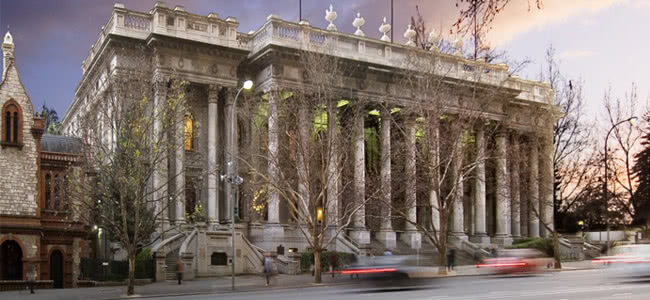After a year of mixed fortunes for Adelaide’s live music scene which has seen increasing pressure from licensing regulations creating a difficult financial climate that forced venues to close their doors permanently, the South Australian capital is now experiencing a positive turning point with news that the new Small Bars License Amendment has passed through Parliament unopposed.
The bill was successfully passed by MPs on Monday night, and SLAM, who were bringing the spotlight to the Liberals’ threats to getting the bill cleared, applauded the decision. Writing on their Facebook page yesterday: “The South Australian Opposition have just withdrawn their proposed amendments to cut the new Adelaide small venue licence to 80 patrons… Congratulations to everyone who made it happen!”
Co-founder Helen Marcou told Tone Deaf that the passing of the bill was “really exciting news for Adelaide… We’re really heartened to have such a big plug for the work that SLAM are doing in the South Australian Parliament,” said Ms Marcou.
“A while ago we met with Deputy Premier, Attorney General, and Business Services and Consumers Minister John Rau… we discussed how you can stimulate live music and obviously offering a licence like [the Small Bar Amendment] makes it easier for operators to enter the market is the first step.”
Minister John Rau first lobbied for new, cheaper licenses for venues aimed at creating laneway bars and ‘hole in the wall’ hotspots across Adelaide’s CBD, in June last year. Mr Rau said that the license category would apply to “restaurants, art galleries, live music venues and other new and interesting spaces in the city,” noting that the Small Bars Amendment would “change the way Adelaide is perceived by many young people and help to keep young entrepreneurs in our state.”
The new Adelaide licenses offer more affordable and streamlined options for venues with a capacity of 120 or less, as well as allowing them to be open til’ past midnight, on a new extended application to 2am, all changes made in a bid to encourage smaller bars and sites to host live music, promoting the enlivening of the city’s culture and business diversification.
“This will change the way Adelaide is perceived by many young people and help to keep young entrepreneurs in our state.” – John Rau, Business Services and Consumers MinisterBefore it was passed however, SLAM found Liberal Party Upper House members were seeking to block the bill, attempting to reduce the capacity of the Small Bars Amendment from 120 patrons to just 80, in line with the Australian Hotel Association (AHA).
But as The Australian points out, the newly elected Opposition Leader, Liberal MP Stephen Wade, claims his party had “been consistent in our support for small bars while strongly advocating for community interests.” While AHA SA General Manager Ian Horen had remarked that the Association felt the 120 capacity limit was ‘too high’ but had “not lobbied in any way to stop” the introduction of the new laws as part of their ‘Right To Object’ clause.
“In the past with the ‘Right To Object’, it meant that the competition, ie. the pubs and clubs, were objecting to new licences and putting on really absurd conditions like ‘no grunge music’ or ‘no advertising’ or you couldn’t sell Australian beer,” said SLAM’s Helen Marcou of the outdated liquor licensing, which under previous guidelines was buried in a range of archaic, and frankly bizarre restrictions and requirements of applications and licensing.
Echoing SA Arts spokesperson Tammy Franks concerns and criticisms over the restrictive policies, Ms Marcou emphasised how red tape was “tying up the resources of young entrepreneurs trying to open new live music venues in courts fighting the objections,” adding that the new Small Bars Amendment allowed for greater diversity and flexibility; “This will really change the landscape in Adelaide rather quickly.”
The Parliament also removed the previous right of nearby residential homes and hotels to have onus in objecting to live music in the area, essentially reversing the priority given to noise complaints and residential development – issues that remain a crucial hot topic in other states such as Melbourne and Sydney.
The new licenses do not permit gaming or gambling in venues under 120 patrons, putting the focus primarily on laneway style bars that host live music and other forms of entertainment.
As The Australian reports, the new Small Bars Amendment will be limited to within the Adelaide CBD for 12 months, but is likely to extend to the suburbs should the trial prove successful, helping develop ‘entertainment strips’ in areas under the new regulations.
“I think it’s really important to focus on these positives, because through getting up there and talking to the big boys we can actually initiate change,” said SLAM’s Helen Marcou of the new bill. “Social media has had a lot to do with that in South Australia, pointing to the awareness raised through the spotlight thrown on plans to block and “distill the potency” of the bill on Facebook and Twitter.
“That sort of community sentiment makes governments stand up and listen,” she said.




































